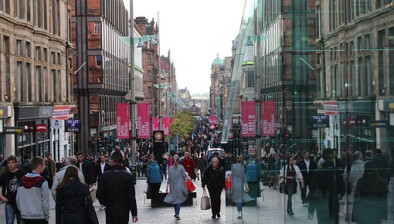England: Black people over three times more likely to experience homelessness

Black people are three and a half times as likely to experience statutory homelessness as White British people, according to a new report authored by Heriot-Watt University.
Conducted in partnership with Race on the Agenda, and funded by Oak Foundation, the report has found that in England, the highest levels of homelessness risks are experienced by people from Black and minoritised ethnic backgrounds.
The report, the first in a series, found that experience of discrimination, harassment or abuse on the grounds of race or ethnicity in housing, or in other aspects of life, appears to be associated with elevated risks of homelessness.
Amongst Black people with experience of homelessness, one third (32%) report discrimination from a social or private landlord. This may indicate that experiences of discrimination drive heightened exposure to homelessness and/or that Black and other minoritised ethic groups who are homeless are exposed to higher levels of discriminatory behaviour.
The programme of research, the largest and most comprehensive of its type in recent years, was delivered with input and support from an expert group including race and equalities experts, national housing and homelessness charities, and the leading independent social change organisation working to solve UK poverty. Its technical work, delivered by Heriot-Watt University, used sources provided by the UK Data Service, Government Statistical services and ONS. The expert advisory group share a combined commitment to identify and understand the causes of homelessness amongst Black and minoritised ethnic communities.
Homelessness and Black and Minoritised Ethnic Communities in the UK: A Statistical Report on the State of the Nation is the first in a wider knowledge and capacity building programme. It aims to support a fundamental step change in the UK evidence base on homelessness amongst people from Black and minoritised ethnic communities.
The three-year programme intends to offer a comprehensive account of the overall statistical picture of the experience of homeless people from different ethnic backgrounds, alongside rich qualitative evidence from research ‘deep dives’ into key groups and issues. Designed to better inform priorities, tools and levers for intervention that can reduce and eliminate racial discrimination, disparities and injustices in the homelessness and housing field, further reports are planned.
Heriot-Watt University adopted wide definitions of homelessness in the analysis including the worst forms such as rough sleeping and sofa surfing, as well as statutory homelessness and households at risk. This allowed for greater engagement in the ways in which homelessness impacts on people from Black and minoritised ethnic communities.
The report found that race, ethnicity and discrimination-related factors affect homelessness risks indirectly as well directly through increased levels of poverty, or the chances of being a renter rather than an owner, which in turn increases exposure to homelessness. Once these indirect effects are accounted for, the relative risk of homelessness for Black and some other ethnic minority-led households is significantly larger than when only direct effects are considered.
For example, for a Black-led household reporting discrimination, with characteristics which are otherwise typical of the population as a whole, the risk of homelessness is nearly 50% greater than that of a White-led household with otherwise typical characteristics, with two-thirds of that effect being indirect via poverty and housing conditions.
Asian people experience lower rates of both statutory homelessness and ‘core’ (the most extreme) forms of homelessness than Black people.2 Asian people are at highly disproportionate risk of more hidden aspects of homelessness, such as overcrowding or ‘doubling up’ with other households. Pakistani and Bangladeshi households face greater risks of homelessness than Indian and other Asian groups.
Significant geographical variations were found in the extent and nature of homelessness risk for different racial groups across the UK, with Black and minoritised ethnic communities living in London facing substantially higher risks.
The position in Scotland has been different to England, with self-reported levels of homelessness amongst Black and minoritised ethnic-led households very similar to those amongst White-led households, although recent statutory homelessness data indicates rising homelessness affecting Black and Other ethnic groups.
In Wales, statutory homelessness shows a similar picture to England, with a high incidence for Black Other and Mixed ethnicity-led households and a slightly higher incidence for Asian-led households. Comparable data for Northern Ireland is sparse, but ‘doubling up’ with other households seems relatively prevalent for Mixed and Other ethnic groups.
Professor Glen Bramley, Institute of Social Policy, Housing, Equalities Research (I-SPHERE) at Heriot-Watt University and co-author of the report, said: “This report reveals the shocking extent of disparities in homelessness risks experienced between some ethnic minoritised groups and White people living in the UK today. What is particularly distressing about the findings is the apparent link between homelessness and race discrimination.
“This needs further investigation, and we are committed to this ongoing work. In subsequent reports, with more in-depth statistical analysis and through the addition of a supporting body of qualitative evidence, we hope to better inform the housing sector and government and, in turn, help to address these stark inequalities in the most extreme forms of housing need.”
The academic team used statistical modelling to analyse the factors that have an independent effect in increasing the chances of experiencing homelessness, when other relevant factors are held constant, and demonstrated that race and ethnicity continue to play a significant role in heightening some people’s exposure to the trauma of homelessness. The wider programme of work aims to deepen understanding of both its causes and potential solutions.
Ali Ahmed from Race on the Agenda (ROTA) said: “The findings of this report are harrowing but are sadly not unexpected. As an organisation which works with marginalised communities across the country, we are seeing the impact of these findings every day as Black and minoritised ethnic communities remain overrepresented in the most deprived neighbourhoods and households nationally. The findings of this report are important and timely, adding essential statistical evidence of discrimination and underpinning ROTA’s continued call for urgent policy change from central and devolved governments.”
Dr Halima Begum, CEO of the Runnymede Trust said: “This report makes for extremely difficult reading, but sadly its findings aren’t surprising. What this research makes clear is that the heightened risk of homelessness faced by certain ethnic minority communities cannot be fully explained just in socio-economic or demographic terms alone, but are in fact down to a person’s race and ethnicity when those other factors remain a constant across all those experiencing homelessness.
“As with homelessness, racism is structural and is woven into the processes and practices of systems and institutions which should act as the safety net preventing people from becoming homelessness to begin with, and then supporting them to escape the cycle of exclusion once they become homeless. The safety nets are not working for minority groups. We are particularly concerned that Black and Mixed Ethnicity people in London experience homelessness so disproportionately, as we look across to the government’s levelling up approach, with its focus on location and socioeconomics, which clearly omits the urgent unmet needs in inner cities across the UK where people are crying out for targeted support.
“Until we begin to tackle the structural causes of these issues, the intersections of race and poverty, and discrimination within our private and social housing structures, devastatingly we expect these figures to continue to rise as the cost of living drives more and more working people into destitution, through no fault of their own.”
Matt Downie, Crisis chief executive, said: “This report should shame us as a country. Every day we see in our services that black, Asian and minority ethnic groups are experiencing higher rates of homelessness, but this research puts beyond doubt the reality and scale of the problem. It is horrifying that people are being exposed to harassment and abuse in the pursuit of trying to find somewhere safe and secure to live.
“It cannot be denied that racism, inequality and poverty are interlinked, and that a lack of safe and settled housing, job opportunities and poor wages are pushing people into homelessness. The homelessness sector, national and local government, and wider society must acknowledge and root out these injustices and advocate for long term systemic solutions if we’re to ultimately end homelessness for good.”
Polly Neate, chief executive of Shelter, said: “Racial inequality and discrimination are hard-wired into our housing system. This report shows, once again, that the housing emergency disproportionately impacts Black and minoritised ethnic communities. The direct link between homelessness and racial discrimination cannot be ignored and more has to be done. Heriot-Watt’s work is helping to lead the way.
“Homelessness is a structural problem that needs major structural solutions. Any commitment to ending homelessness and creating a fair and secure housing system, must take into account the clear role that the legacy of racial discrimination has played and how it continues to plague society.”
The academic team, with input from the wider advisory expert group, will now deliver a more focussed exploration of the experiences of specific ethnic groups, and interrelationships with demographics (including age, gender and household type), migration, citizenship status, religion and language. The programme will further explore the contrasts between London and other parts of the country and undertake local and household level analyses where possible in England, Scotland and Wales.








